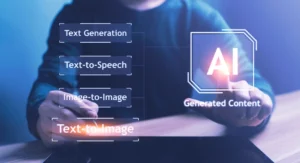-
Contents
- Introduction
- Generative AI in Content Creation
- Benefits and Applications
- Ethical Considerations and Challenges
- Comparison
- Future Implications
- Conclusion
- FAQs
- Trusted Sources:

Introduction
The field of education is undergoing a transformative revolution with the advent of Generative Artificial Intelligence (AI). By leveraging the power of advanced technologies, Generative AI has the potential to revolutionize content creation in training, education, and tutoring. Traditional methods often face limitations and challenges in terms of efficiency and personalization. However, Generative AI opens up new possibilities for educators and learners alike, offering efficient and customizable educational materials, training modules, and tutoring resources.
Generative AI in Content Creation
Generative AI is revolutionizing content creation in the field of education, introducing a groundbreaking approach that harnesses the power of machine learning algorithms. This innovative technology enables the generation of educational materials, training modules, and tutoring resources that are specifically designed to cater to the unique needs of individual learners. By leveraging Generative AI, educators can now provide highly personalized and adaptive learning experiences to their students.
One of the key advantages of Generative AI is its ability to streamline the content creation process. With traditional methods, developing educational materials can be a time-consuming and labor-intensive task. However, Generative AI models can swiftly generate a vast amount of high-quality content, significantly reducing the time and effort required from educators. This efficiency allows them to focus more on student engagement and instructional delivery, enhancing the overall learning experience.
Moreover, Generative AI empowers educators to create content that is highly tailored to the specific requirements of each learner. By analyzing individual preferences, learning styles, and progress, AI algorithms can generate personalized materials that resonate with students on a deeper level. This adaptability ensures that learners receive the most relevant and engaging content, leading to improved knowledge retention and academic performance.
The use of Generative AI in education also opens up new possibilities for adaptive learning. These AI-generated assets can dynamically adapt to students’ progress and provide real-time feedback, fostering a more interactive and responsive learning environment. By continuously analyzing learners’ performance, Generative AI can offer personalized recommendations, additional resources, and targeted interventions to support their educational journey.
It is important to note that while Generative AI brings significant benefits to content creation in education, ethical considerations must be addressed. Ensuring the accuracy, credibility, and inclusivity of AI-generated content is of utmost importance. Educators and developers need to be vigilant in avoiding biases and ensuring that the content reflects diverse perspectives. Human guidance and oversight are crucial to maintain the integrity of the educational experience and strike the right balance between automation and human expertise.

Benefits and Applications
The benefits and applications of Generative AI in the realm of education, training, and tutoring are vast and transformative. One of the key advantages is the enhanced engagement it brings to the learning process. Generative AI enables the creation of interactive and immersive learning experiences that captivate learners’ attention. By tailoring the content to individual learning styles and preferences, Generative AI ensures that learners are actively involved and motivated throughout their educational journey.
Scalability is another significant benefit offered by Generative AI. Educational institutions can leverage AI-generated content to reach a broader audience and cater to the diverse needs of learners. Whether it’s providing educational resources to remote areas or accommodating a large number of students, Generative AI allows for the efficient distribution of educational materials on a larger scale.
Furthermore, Generative AI facilitates the creation of dynamic and customized educational content. With AI algorithms continuously analyzing data and adapting to changing circumstances, the generated content can be regularly updated to reflect the latest information and developments. This ensures that learners have access to up-to-date and relevant resources that align with the evolving educational landscape.
The real-world applications of Generative AI in education are already demonstrating its transformative potential. Virtual tutors powered by AI algorithms provide personalized feedback and guidance, catering to the unique needs of individual learners. AI-generated training modules enable the acquisition of specialized skills in diverse domains, opening up new avenues for career development and lifelong learning. These success stories highlight how Generative AI empowers learners, educators, and trainers alike, fostering creativity, critical thinking, and a culture of continuous learning.
Ethical Considerations and Challenges
As with any transformative technology, Generative AI in content creation raises ethical considerations. Ensuring accuracy, credibility, and inclusivity in AI-generated materials is paramount. Educators and developers must maintain a balance between automation and human guidance, combining the strengths of AI with the expertise and empathy of human educators. Transparent and responsible practices should be implemented to mitigate biases and foster equal access to educational opportunities.
Comparison
When considering the comparison between traditional content creation methods and Generative AI-driven approaches, it becomes apparent that Generative AI offers significant advantages. Traditional methods often face challenges in scalability, personalization, and keeping up with the evolving requirements of education. These methods may struggle to produce a large volume of content efficiently, resulting in limitations in reaching a wider audience.
In contrast, Generative AI empowers educators and content creators to overcome these limitations. With Generative AI, the process of content creation becomes faster and more efficient. AI algorithms can rapidly generate educational materials, training modules, and tutoring resources, allowing for the creation of a vast amount of content in a short period of time. This scalability enables educational institutions to meet the increasing demand for quality educational resources.
Furthermore, Generative AI offers adaptability and personalization in content creation. AI algorithms can analyze data and learner profiles to tailor the content to individual needs and preferences. This personalized approach ensures that learners receive content that is relevant to their specific learning styles, enabling them to engage more deeply and effectively with the educational materials.
By harnessing Generative AI, the field of education can become more accessible, efficient, and effective in meeting the diverse needs of learners. The ability to rapidly create customized content allows for a more inclusive and adaptive educational experience. Learners from different backgrounds and with varying learning preferences can benefit from AI-generated materials that cater to their individual requirements.
Future Implications
The future of content creation in education, training, and tutoring is intertwined with Generative AI. As the technology advances, we can anticipate a shift towards more personalized, immersive, and learner-centric experiences. AI-generated content will continue to evolve, incorporating real-time data analysis, adaptive learning algorithms, and natural language generation. By embracing Generative AI, educational institutions can unlock the full potential of technology to foster lifelong learning and prepare learners for the challenges of the future.
Conclusion
Generative AI holds tremendous promise in empowering education by revolutionizing content creation for training, education, and tutoring. The integration of AI-generated materials, training modules, and tutoring resources enhances engagement, scalability, and personalization. By adopting Generative AI, educational institutions can stay competitive in an ever-evolving landscape, delivering high-quality and adaptive learning experiences. As we embrace this transformative technology, we must ensure ethical practices and leverage the strengths of both AI and human educators to shape a brighter future for education.
FAQs
Trusted Sources:
UNESCO – “Artificial Intelligence for Sustainable Development in Education”
EdSurge – “The Role of Artificial Intelligence in Education”
Stanford University – “Using Artificial Intelligence to Improve Education”
Harvard Business Review – “The Promise and Peril of Artificial Intelligence in Education”
Forbes – “How AI is Transforming Education and Personalized Learning”
World Economic Forum – “Artificial Intelligence and the Future of Education”
The Guardian – “Artificial intelligence in schools: what works and who benefits?”
McKinsey & Company – “Artificial Intelligence and Machine Learning in Education”
eLearning Industry – “The Role of AI in eLearning: Benefits and Challenges”
MIT Technology Review – “AI Can Personalize Education. But Is It Worth It?”



